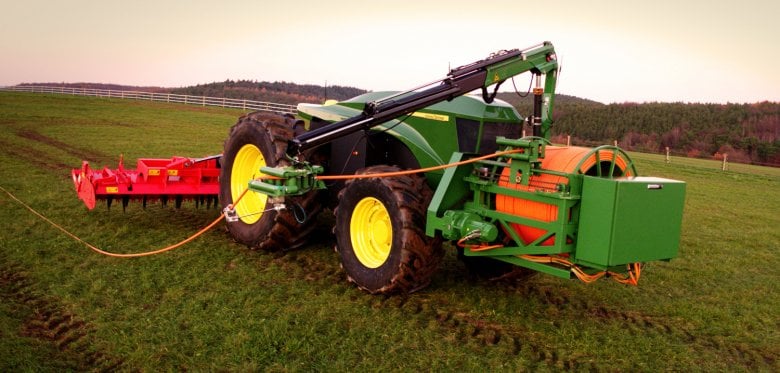When it comes to technological breakthroughs and innovation, farming equipment giant John Deere...
An Electric Tractor May Be Coming to a Showroom Near You

It’s been nearly 30 years since Steve Heckeroth designed and built his first electric tractor. Since then, he’s converted diesel tractors to electric power, custom-built electric tractors, and even assembled an experimental electric tractor for Ford New Holland as early as 1995. Today, as founder of Solectrac, Heckeroth is finally seeing electric tractors taken seriously by both customers and other manufacturers.
California-based Solectrac has sold about two dozen of its battery-powered tractors since 2018 and has accumulated about $1 million worth of back orders because of pandemic-related issues.
“The biggest problem with electric cars is the weight of the batteries,” says Heckeroth, who has a background in solar power and electric vehicles. “I realized very quickly that weight on a tractor is actually an asset that improves traction.”
More than 14 countries and over 20 cities have proposed or enacted bans on the sale of cars and, in some cases, light trucks powered by fossil fuels. The bans will go into effect from five to 20 years from now. Heckeroth expects a ban on small gasoline- and diesel-powered tractors to follow, especially in large cities. The push to reduce air pollution is primarily driving the market, but he lists a number of benefits an electric tractor offers over its diesel counterpart. “In addition to being cleaner and quieter, an electric tractor is much more efficient, since all the energy goes into work. Whereas, in a diesel tractor, much of it is wasted as heat,” he explains. “In addition, maximum torque is available immediately rather than at rated engine speed. Finally, since the power source has just one moving part, these motors require very little maintenance. Even the batteries are projected to last 10 years, pending operating cycles and depth of discharge.”
Solectrac currently offers a 30hp compact and a 40hp utility model. The company just introduced a 70-hp vineyard and orchard tractor, which addresses the specific needs of that specialty market with its narrow width and greater horsepower.
JOHN DEERE GridCON
Unfortunately, some don’t see electric tractors going much higher than 100hp or much longer than a few hours on a charge with current technology. John Deere has attempted to remedy those issues with its cable-powered prototype GridCON. Unlike its earlier battery-powered prototypes, the fully electric, autonomous tractor provides up to 400hp (300 KWh) and is powered by an electric cable connection from the field border to the tractor via a drum that carries more than 1,000 yards of cable. “The biggest challenge for battery electric tractors is available energy capacity in batteries today compared with the energy required for typical farming operations,” says Dennis Muszalski, Director, Module and Electrification System Engineering, John Deere. “During the critical windows of planting and harvesting, availability of equipment is paramount. Our customers can’t afford any delays due to limitations of battery capacity resulting in frequent and lengthy recharging.”
Although prices aren’t available yet for prototype models, the Monarch has a base price of $50,000. Solectrac tractors currently list for about 20% more than a comparable diesel model. However, the lower maintenance costs should offset much of that.
EDITOR’S TAKE:
Another interesting technological development that could potentially help agricultural efficiency and perhaps lower overall cost of operating a tractor. It certainly appears that the technology has improved dramatically over the years and is coming ever closer to commercialization on a much larger scale. It is also obvious that John Deere is hedging all bets with their investments in ethanol heavy duty engine technology and electric tractors. Either way, it appears farmers/ranchers will be the ultimate beneficiary of these investments and technologies.






